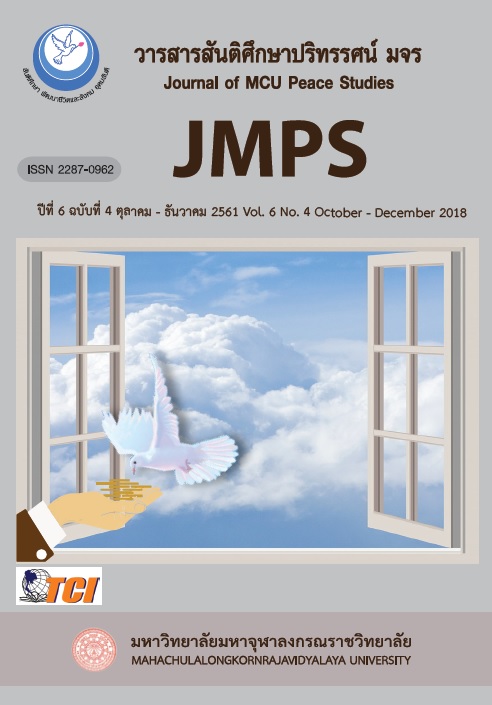การเสริมสร้างจริยธรรมสำหรับผู้ต้องขังในเขตกรุงเทพมหานคร
Main Article Content
บทคัดย่อ
The objectives of this research were 1) to analyze ethics problems situation of prisoners in Bangkok 2) to analyze the ethics strengthening process according to Buddhist integration for prisoners in Bangkok and 3) to present the results of the ethics strengthening process according to Buddhist integration for prisoners in Bangkok. This research was a mixed method research. The sample consisted of 144 prisoners in the central correction institution for drug addicts, aged 18-25 years, who enrolled in Sakkasa Concentration Project 2. The tools of data collection were questionnaires, in-depth interview and focus group. Pair sample t-test and analytic induction were used for data analysis.
Research findings were as follow:
- 1. Ethics problems situation of prisoners in Thai society found that most prisoners were prisoners of drug cases. Most causes of this issues are from economic problems, inadequate income to support the family, the value of comfort, rich shortcuts and wrong social imitation behavior. The main causes of offence recidivism are the lack of social acceptance and unemployed.
- 2. The ethics strengthening process according to Buddhist integration for prisoners are to control , to develop habitual behavior and to apply principles which are the five precepts (Sãla), the noble eightfold path (Magga), the four bases of social solidarity (Saïgahavatthu), the four holy abiding, critical reflection (Yonisomanasikàra) and two Lokapala-dhamma; moral shame and moral dread (Hiri and Ottappa). The main processes are: 1) the practice of right view (Sammàdiññhi) 2) the process of threefold Learning (Sikkhàttaya) which are morality, concentration and wisdom training 3) the practice of Buddhist activities in daily life and in Important Buddhist Day
- 3. The participants in the Sakkasa Concentration Project 2 had higher scores on Buddhist ethics as a total at the significance level.
Article Details
ทัศนะและความคิดเห็นที่ปรากฏในบทความในวารสาร ถือเป็นความรับผิดชอบของผู้เขียนบทความนั้น และไม่ถือเป็นทัศนะและความรับผิดชอบของกองบรรณาธิการ ยินยอมว่าบทความเป็นลิขสิทธิ์ของวารสาร


